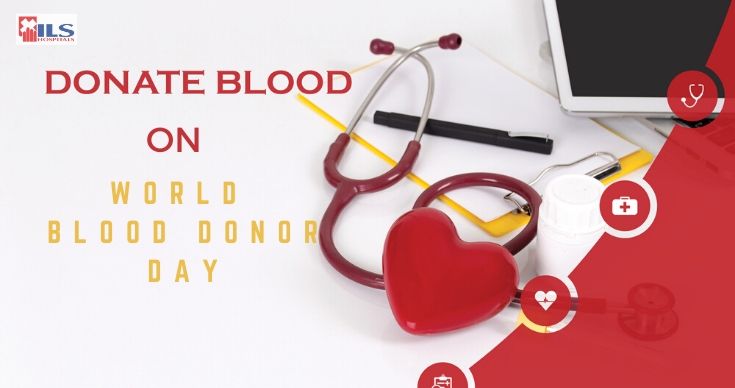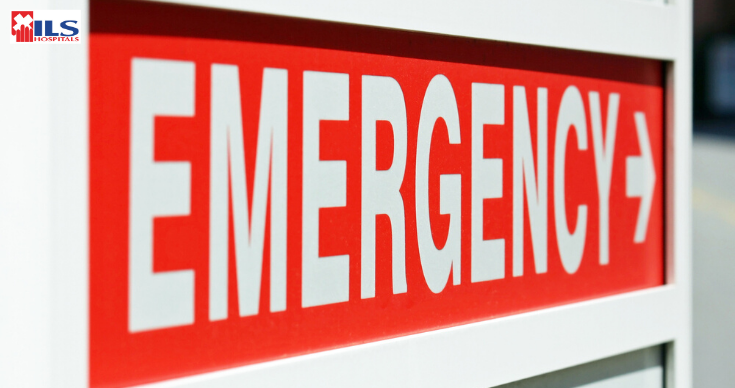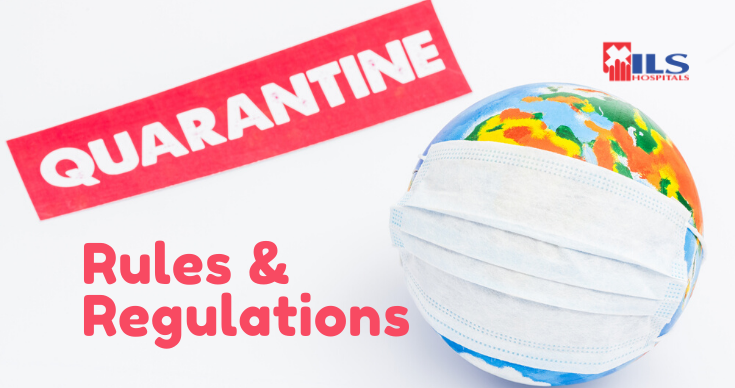ILS Hospitals’ Guide On How To Prevent Fatigue
Feeling fatigued is, unfortunately, the new normal. All due to our modern lifestyle and more so because most of us are working from home due to this Pandemic situation. We are working extra to make up for the lost hours. Slow down, take deep breaths, and relax.
Fatigue is nobody’s friend. Preventing fatigue is better than combating it. Today, ILS Hospitals, one of the best hospitals in Kolkata and Agartala will guide on how to prevent fatigue.
Eat a well-balanced diet
A well-balanced diet will ensure that your body is not deprived of any nutrients. Include protein, carbohydrates, fibers, vitamins, minerals, and good fats in your daily diet.
Drink water every hour
Dehydration leads to fatigue. Hence, stay properly hydrated by sipping water every hour. If you tend to forget drinking water then ensure a system where you are reminded to take water every hour.
Sleep early
Staying awake at night can cause lethargy. Think of your body clock and sleep on time.
Wake up early
Waking up late is one of the causes for drowsiness. So, if you wake up late you find yourself left with fewer hours to finish your daily activities, so yes, embrace waking up early.
Be active
Be physically active and shun your sedentary lifestyle. Exercise regularly as exercising keeps you energized throughout the day and beats insomnia.
Stay stress-free
Stress is the part and parcel of our today’s lifestyle. However, chronic stress hampers your immunity and mental health. When you are stressed, you feel physically exhausted. So, don’t stress.
Take breaks
Taking breaks between your work is not being selfish. It’s a necessity to keep you sane and refreshed. If you work constantly without taking proper breaks, then you invite fatigue. So, take breaks as and when required.
Hope this guide helps you. For any health-related concern, do not hesitate to visit ILS Hospitals, one of the best hospitals in Agartala and Kolkata.
World Tobacco Day: How To Quit Smoking Once And For All
We all know why smoking is considered a bad habit and how smoking affects our health. We all know how smoking kills. Yet, many people find it difficult to quit smoking permanently. The reason – nicotine addiction.
On World Tobacco Day, ILS Hospitals, one of the most renowned multispeciality hospitals in Kolkata and Agartala will show you effective ways to quit smoking for once and for all.
Know your reason
If there’s a will, there’s a way. If you add reason to your plan, it makes more sense and you have a higher chance of success. People smoke for various reasons, but, the most common reason is to get temporary relief from stress. Then why a sudden decision to want to quit smoking? Is it because you want to live a healthier lifestyle or is it because you want to keep yourself and your family healthy and safe? Know your reason.
Be determined
Determination is your best friend now. Be determined that you have to quit smoking no matter what.
Pledge to live a healthier lifestyle
Smoking is one of the unhealthy habits ever known. If you swap it with healthy habits, like eating healthy food, sleeping on time, doing regular exercise, then it would become easier for you to quit this unhealthy habit.
Avoid social gatherings with smokers
Human beings imitate others. When you’re on your way to quit smoking, you should avoid hanging out with your friends who are avid smokers so that you do not crave for cigarettes.
Stop the consumption of alcohol
People generally smoke cigarettes while consuming alcohol as it relaxes them. Well, it’s a temporary relaxation. For those who have newly quit smoking should definitely avoid the consumption of alcohol.
Find your support system
Your partner, friends, and family love you more than you know. If not for yourself, quit smoking for the sake of your loved ones. Let them know that you care for them, you’re on your journey to quit smoking and making them proud of you.
Keep yourself occupied in other activities
There are many productive things to do other than smoking. You should involve yourself in other activities, like doing household chores, spending time with your loved ones, reading books, watching informative and motivational videos, and upskilling yourself by learning a new course.
Seek professional medical therapy
If nothing else works, professional medical therapy will. Seek professional medical therapy for your nicotine dependence.
At least try to cut down the number of cigarettes you consume a day. Your journey will be difficult but worth it. ILS Hospitals, one of the best hospitals in Agartala and Kolkata wishes you best of luck.
World Blood Donor Day: Donate Plasma to Save lives
Donation is the most beautiful thing ever known to humankind. Blood donation is the key to saving lives. When you donate blood, you not only save people’s lives but also your own as blood donation provides the donor with additional health benefits. Upon that, let’s not forget how fulfilled your life would become once you save another human’s life. Today, ILS Hospitals, one of the best hospitals in Kolkata and Agartala will enlighten you on plasma donation.
Plasma is the yellowish part of the blood and performs vital functions, like transporting nutrients to the body parts and fighting infection. Donating plasma has been called the gift of life. Donating plasma helps in providing therapies for rare diseases and conditions. Plasma therapy has been found effective in treating critically-ill COVID-19 patients. Plasma donation is the need of the hour. You can donate plasma in two ways:
1st way – by donating your whole blood so that the plasma gets separated from the blood in the laboratory.
2nd way – by donating only the plasma through the process of plasmapheresis.
Plasma donation not only helps the recipient but also the donor. Here’s how.
Free health checkup from expert medical professionals
Before you donate plasma, your body will be thoroughly examined by the medical professionals to check your health status. This way you’ll be ensured of your body’s well-being.
Improves health
Plasma donation will motivate you to take better care of your body. Upon that, if you’re diagnosed with any health condition during your mini health check-up, you’ll get instant medical attention from the doctors.
Reduces bad cholesterol
Bad cholesterol is a generic problem. Plasma donation might help in the reduction of bad cholesterol.
Benefits psychological health
When you help others, you help yourself. When you find that your plasma has saved someone’s life you’ll get instant psychological satisfaction.
As we have mentioned earlier, plasma therapy has been found helpful in treating serious Coronavirus patients. In Convalescent plasma therapy, the plasma is extracted from recovered COVID-19 individuals for providing treatment to critically-ill COVID-19 patients. Plasma contains antibodies that help in fighting foreign pathogens. The ones who have recovered from COVID-19 are now immune to the virus and by using their plasma we can save others from this deadly Coronavirus.
If you’ve recovered fully from COVID-19 and are willing to donate your plasma to save lives, visit your nearest blood collection centre. ILS Hospitals in Agartala and Kolkata applauds such brave hearts who have donated their plasma to give people the gift of life.
How To Handle A Medical Emergency Effectively
A medical emergency is a serious condition that requires immediate medical supervision or else it can cause serious harm or injury to the affected person. Few examples of a medical emergency are burns, poisoning, injuries, bleeding, shock, strokes, severe allergic reactions and so on.
Not everyone knows what to do in case of a medical emergency, so ILS Hospitals, one of the best hospitals in Agartala and Kolkata will tell you how to handle a medical emergency effectively.
So without adding anything else, let’s continue further.
Stay Calm And Composed
Medical emergency is an alarming situation and can make people anxious. First and foremost thing to do during a medical emergency is to have a calm and composed demeanour until help arrives. Take deep breaths to calm your nerves and get relief from anxiety.
Call Medical Emergency Services At Once
Help takes time to arrive. So, whenever you notice someone in need of urgent medical supervision, call your local hospital for an ambulance without any delay.
Always Carry A First Aid Kit
First aid kit should be inside every home, school, college, office and any other organisations. You should even keep a small medical toolbox inside your car and backpack. Provide first aid to the patient to avoid any further damage.
Give CPR To The Patient
If the patient does not breathe despite a pulse then perform a CPR (Cardio-Pulmonary Resuscitation) or tell someone else to perform one if you do not know the CPR procedure. Ensure that the patient’s airway is not restricted by removing the patient’s tight clothing. Remember, it’s an emergency so you need to do things as required.
Always help people in need of medical emergencies whether you know them or not. For any medical emergency, you can visit ILS Hospitals, one of the best hospitals in Kolkata and Agartala.
Let’s Know More About Juvenile Diabetes
Juvenile diabetes or simply called diabetes in children is on the rise today. It was earlier believed to be the disease effecting only the elderly. But now it is found in children and younger people as well.
Diabetes – two types – Type 1 and Type 2. In type 1 diabetes, the pancreas does not make insulin while in type 2 diabetes, the body does not make sufficient insulin or does not use the produced insulin effectively. Significantly, type 1 diabetes is more common in children.
The primary cause of juvenile diabetes is genetics. Let’s discuss the symptoms of diabetes in children.
-
Frequent urination
-
Increased hunger and thirst
-
Fatigue
-
Fruity-smelling breath
-
Sudden weight loss
-
Hazy vision
-
Irritability.
Diagnosis
Although symptoms are enough to prove diabetes mellitus in children but for proper confirmation, certain diagnostic tests are recommended by the paediatric diabetologist. So, the question arises, what are the diagnostic tests performed to confirm juvenile diabetes.
The diagnostic tests for diagnosing diabetes in children are as follows:
-
Blood Sugar Test (both fasting and random)
-
Glycated Haemoglobin (A1C) Test
-
Urine Test.
Treatment
Diabetes treatment in children as generally prescribed by the paediatric diabetologist includes the following:
-
Medications
-
Insulin injections
-
Regular monitoring of blood sugar levels
-
Changes in diet and lifestyle.
Prevention
We believe prevention to be always better than cure. Is there any way to prevent diabetes in children? Sure, there are many ways you can prevent your children from getting diabetes. Some of them are as follows:
-
Encouraging them to be more active
-
Feeding them healthy meals
-
Cutting back on their sugar intake.
Getting timely diabetes treatment is vital for your child. Hospitals in Kolkata and Agartala offer Juvenile diabetes treatment from the best diabetologists.
Let’s Learn About Different Vitamins And Their Importance In Our Body
For a healthy body, we need an adequate amount of carbohydrates, protein, good fats, vitamins and minerals. There are different kind of vitamins that perform different functions in our body. Today, ILS Hospitals, one of the best hospitals in Kolkata and Agartala, will enlighten you about different vitamins and their importance in the human body.
Vitamin A
Vitamin A is crucial for healthy vision and preventing night blindness. This vitamin also helps in fostering cell development, healthy bones and teeth. Vitamin A ensures good reproductive health and allows the other organs like kidney, heart and lungs to function properly.
Best food sources: Eggs, fish, carrots, dairy products, spinach, pumpkin etc.
Vitamin B
Vitamin B helps in the body’s metabolism and cell development. There are different types of vitamin B, each performing their own functions. Let’s talk about a few here.
Vitamin B9 (Folic Acid or Folate): Vitamin B9 converts food into energy and is vital for pregnant women to help prevent congenital defects. Folate can be derived from natural food sources (eggs, fish, beans, peas and so on) while folic acid, being a synthetic form is consumed in the form of pills.
Biotin (also called Vitamin B7, B8 and Vitamin H): Biotin maintains the body’s metabolism and improves the health of skin, hair, and nails. Best food sources for biotin are egg yolks, soybeans and fish, sweet potatoes, chicken liver, whole grains, etc.
Vitamin B12 (Cobalamin): Vitamin B12 helps in the formation of red blood cells, DNA, RNA and myelin. This vitamin prevents congenital defects, memory loss and depression.
Best food sources: Vitamin B12 is present in almost all animal products, like eggs, milk, seafood, and meat.
Vitamin C
Vitamin C repairs the body tissues and strengthens the immune system. It fosters the wound healing process and protects cells from any damage.
Best food sources: All citrus fruits, cauliflower, capsicum, papaya etc.
Vitamin D
Vitamin D ensures healthy bones by allowing the body to absorb calcium, maintains phosphorus levels in the blood and reduces depression.
Best food sources: Egg yolks, cod liver oil, fatty fishes, mushrooms, milk and milk products.
Vitamin E
Vitamin E prevents cell damage, heart diseases and inflammation. It is best for promoting good vision, healthy hair and skin.
Best food sources: Almonds, peanuts, walnuts, olive oil, sunflower oil, dried apricots etc.
Vitamin K
Vitamin K helps in blood clotting, prevents osteoporosis, tooth decay and certain diseases.
Best food sources: Soybeans, egg yolks, chicken, cabbage, spinach and pumpkin.
We hope you found this blog informative. Hospitals in Agartala and Kolkata is always available to give you good medical service.
How To Be Productive During Your Home Quarantine
Due to COVID-19, the entire country is in lockdown, except for essential services, like hospitals, grocery stores, medicine stores and few more. Since there is no vaccine for Coronavirus as on date, we are compelled to stay inside our homes and practice social distancing to keep the number of cases low.
Home quarantine allows us plenty of time. We can utilize this time to spend time with our family and learn skills to enhance our personality. Today, ILS Hospitals, one of the best hospitals in Kolkata and Agartala will show you some ways through which you can stay productive during this home quarantine.
Learn a new hobby
Sadly, people were not spending enough time on their hobbies. Hobbies started losing its essence. Don’t let that happen, learn a new hobby or give more time to your existing hobby during this home quarantine. You can learn new hobbies, like cooking, sewing, knitting, etc. even by watching online tutorials.
Organize your home
No matter how big or small your home is, it is always beautiful. Since everyone is in the house right now, you can make the use of more muscle power to declutter and organize your home.
Read educational books
Reading is always helpful. If you have children in your home, know that children learn by imitating others. If they see you reading educational books, they will follow suit.
Participate in online classes
Online classes are beneficial for both parents and children. Teach your children through online methods. Opt for online classes to enhance your professional skills for growth in your career.
Stay hygienic and stay safe at home. Listen to the government’s advisories and be a responsible citizen. Remember, health is wealth so take good care of your mental and physical health. For any medical emergency, you can visit ILS Hospitals in Agartala and Kolkata.
Covid-19: Follow Rules And Regulations To Be Safe And Healthy
COVID-19 is a highly communicable disease, hence both the central and state government took the right initiative to flatten the curve – lockdown. The government is doing what it can during this medical emergency but we as a citizen of civil society must follow the rules and regulations dictated by the government for our and everyone else’s safety.
Today, ILS Hospitals, one of the best hospitals in Agartala and Kolkata will discuss the importance of following rules and regulations laid by the government. Firstly, we do not have a perfect cure for COVID-19, secondly, there’s a lot more undiscovered about this newly mutated virus, Coronavirus, and thirdly it is highly infectious and can infect many people through community transmission.
So, let’s know what rules we must follow to avoid getting infected with Coronavirus.
Practice Social Distancing
There’s a reason why the government opted for nationwide lockdown. Do not loiter outside and stay safe inside your home. If you go outside to shop for essentials, then maintain 6-feet distance from others. For home deliveries, make online payments and keep a tray outside your house so that you don’t come in direct contact with the delivery man.
Wear a mask and gloves
Do not step outside to make essential purchases or due to any medical emergency, without wearing a mask and preferably disposable gloves. We would recommend you to carry an alcohol-infused hand sanitizer in your bag or pocket.
Wash your hands
Do not forget to wash your hands properly as and when required.
Visit a healthcare facility if you develop flu symptoms
If you develop flu-like symptoms, then visit your nearest healthcare facility.
The lockdown is for your safety and not for restraining your freedom. ILS Hospitals, one of the best Hospitals in Kolkata and Agartala wishes you good health.
How To Have A Healthy Pregnancy During This Covid-19 Situation
COVID-19 pandemic has become a medical emergency in all over the world. It is a very difficult time for all of us. It is more difficult for women who are pregnant during this crisis. But as ILS Hospitals always says, Do not Panic and Stay Alert, following this is the only remedy during this anxious situation.
Today ILS Hospitals, one of the best hospitals in Kolkata and Agartala will suggest the would-be mothers some tips to have a healthy pregnancy during this COVID-19 situation.
Eat a diet full of nutrients
A nutritious diet is the ultimate panacea for pregnant women. You need to consume healthy foods for your baby’s growth and development. Eat fruits, vegetables, legumes, lentils, eggs, seafood, chicken, dry fruits, etc.
Drink plenty of water
Do not ignore the importance of hydration. Drink plenty of filtered water every day. Use a hydration or water reminder app on your smartphone if you constantly forget to drink water.
Take an ample of rest
Your body is responsible for carrying two individuals. Surely, your body is dealing with a lot right now. To compensate for that, take a proper amount of rest every day.
Stay hygienic
Practice good hygiene at all rates. Wash your hands properly and frequently with a good liquid handwash. Use hand sanitizer with 70-90% alcohol and tissue papers while coughing and sneezing and dispose them off at once in a closed bin. Wear a mask and disposable gloves if you have to go out for any medical emergency and live in a well-sanitized environment.
Have a good mental health
Due to this long home quarantine, you might find yourself anxious and depressed which can affect your unborn baby’s well-being as well. Do not stress, watch less news, read good books, play board games with your husband or other family members, watch informative videos and practice meditation or light doctor recomended exercise.
Stay happy and stay safe at home. Visit a good obstetrician-gynaecologist for any medical emergency. ILS Hospitals in Agartala and Kolkata is always present to help you out.
Follow These Hygiene Tips To Avoid The Spread Of Infections
Due to the pandemic, Covid-19, many nations across the globe were badly affected to the core. Covid-19 taught us one thing, which is to maintain good hygiene at all times.
By maintaining proper hygiene, we can prevent the transmission of deadly viral and bacterial infections. Keeping that in mind, ILS Hospitals will explain you some hygiene tips that you must follow to prevent infections.
Follow these hygiene tips to avoid the spread of infections:
Maintain good personal hygiene: Personal hygiene is foremost important. Brush and floss your teeth daily. Take a bath or shower with soap every day. Wash your hair once or twice a week. Due to summer season, you might have to shower twice a day because of excessive perspiration. Wear clean clothes and undergarments daily. Females should take note of their menstrual hygiene as well by changing the sanitary products from time to time.
Wash your hands at all times: There are millions of germs in our hands which are totally invisible to the human eyes. We do a lot of work with our hands so it’s essential to keep them clean. Wash your hands for 15-20 seconds with clear water and liquid soap after using the washroom, before and after eating, after coming from outside, and whenever your hands get dirty.
Live in a clean environment: Keep our surroundings clean. Clean your house daily. Throw the trash in the garbage bin. Do not forget to keep your washrooms hygienic.
Use tissue paper while coughing and sneezing: Always cough or sneeze on a disposable tissue paper. It is always best to wear a face mask while going outside if you have encountered flu so that you avoid transmitting the infection to others.
Do not share your personal items with anyone: Avoid sharing your personal items, like toothbrush, tongue cleaner, razor, comb, nail clippers, clothes, undergarments, innerwear, cosmetics, makeup brushes, soap, loofah and so on with others.
Do not touch your eyes, nose and mouth with uncleaned hands: If your hands are unwashed, you can easily pass on the germs inside your body by simply touching your eyes, nose and mouth. Never do that and we will say again, keep washing hands.
Always carry a hand sanitizer with you: Whenever you’re going outside, always carry a 70% alcohol containing hand sanitizer with you to be hygienic at all times.
Our several hospital units take essential care for hygiene. If you visit our hospital units in Kolkata and Agartala, you would not have to worry about cleanliness. Visit ILS Hospitals, one of the best hospitals in Kolkata and Agartala for medical emergency.




















